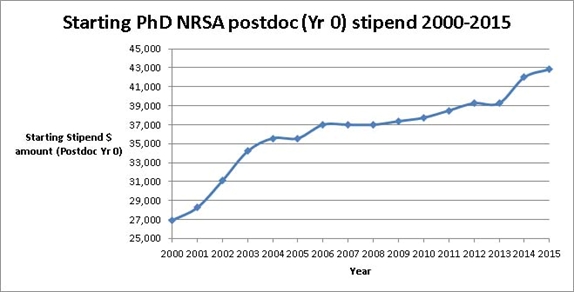The NeuroSkeptic links to a legislative proposal to require overtime for postdocs:
A change in US labour regulations will render many postdocs eligible for overtime pay — and create an incentive to raise their wages. The law may ultimately mean fewer postdocs. But some say that the policy could spark much-needed changes to a research system that relies heavily on postdocs yet offers them few opportunities for career advancement.
The new rule, finalized on 18 May by the US Department of Labor, will make overtime pay mandatory for many postdoctoral researchers who make less than US$47,476 per year. Overtime, which is paid at 1.5 times the normal hourly wage, kicks in once workers exceed 40 hours on the job in one week.
The problem, as the article itself points out, is that it’s relatively painless for a PI to raise their postdoc salary just enough to meet the minimum required to avoid triggering the overtime requirement. This would mean a raise, but only a few percent, and does nothing to address the broader structural problem facing lack of advancement opportunities for postdocs within the field.
Even if postdocs salaries were raised to 50k across the board – which would have a wonderful impact on distributing postdocs across the country and strengthening science at research institutions nationwide – it would do nothing to alleviate the oversupply of postdocs that is destroying career advancement. Congress can’t really achieve more than incrementalist change like this overtime proposal, but the NIH has far more leverage.
Let’s focus the discussion on fields of bioscience that primarily derive funding from the NIH. The NIH sets its own scale for postdoc pay (fiscal year 2015), for postdoc positions it funds as part of the NRSA fellowship (inherently limited by federal funding for the NIH). These NRSA payscales are then used as a benchmark for universities across the nation to set salary levels for their own postdocs. That level has risen dramatically in the past 15 years, but still falls well short of the NIH’s own pledge of $45k:

The NIH imposes salary caps on the amount any given indiovidual may be paid out of an awarded grant. There is no reason the NIH can’t set a minimum level, however – and doing so would not require legislation in Congress and the political process. It would simply be an overnight change.
Imagine for example if the NIH immediately mandated that all postdoc salaries funded by R1 grants had to be funded at 150% of the current NRSA level. Likewise, graduate student support could be immediately mandated as 100% tuition plus stipend. The actual amount of funding however would not change – just the allocation of how that (taxpayer) money is spent. (This would have to apply to all new grants effective the next fiscal year, and not affect currently-funded grants).
The immediate effect would be that fewer graduate students and postdocs could be supported. This would have many downstream ripple effects, but the biggest one would be an exodus of highly trained individuals from academia into other fields and industry, and entrepreneurship. This sounds like a bad thing for science, but the bottom line is that science has progressed on exploited labor for far too long. There are other areas of reform that need to follow, including paying institutional overhead out of grants and the adjunct faculty problem. But those are going to require a. substantial legislative solutions for which there isn’t the political will (because it will cost taxpayer money), and b. self-organization towards unions and collective bargaining, for which there isn’t professional will (because it will require the threat of strikes). Bluntly, science achieves what it does by treating its most valuable assets as commodities. It’s time to revalue, and that will require significant effort. The issue of underpaid postdocs and PhD students is one that is relatively easy to solve, and in doing so will provide much-needed impetus towards those other problems.
I think that solving those issues will in turn lead to solving the other great problem science faces, namely the output problem. But that’s a topic for another day.
(meta: I’ve retired my old science blog, Reference Scan, and have imported the content here. Feel free to browse the Reference Scan category for older posts!)